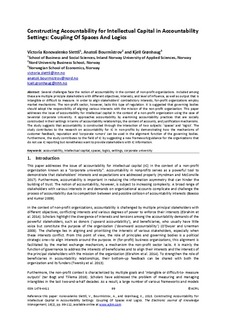Constructing accountability for intellectual capital in accountability settings: coupling of spaces and logics
Journal article, Peer reviewed
Published version
Permanent lenke
http://hdl.handle.net/11250/2600338Utgivelsesdato
2018Metadata
Vis full innførselSamlinger
- Articles (SOL) [143]
- Publikasjoner fra CRIStin (NHH) [249]
Originalversjon
Electronic Journal of Knowledge Management. 2018, 16 (2), 99-112.Sammendrag
Several challenges face the notion of accountability in the context of non-profit organizations. Included among these are multiple principle stakeholders with different objectives, interests, and level of influence, as well as output that is intangible or difficult to measure. In order to align stakeholders’ contradictory interests, for-profit organizations employ market mechanisms. The non-profit sector, however, lacks this type of regulation. It is suggested that governing bodies should adopt the responsibility of aligning various interests with the mission of the non-profit organization. This paper addresses the issue of accountability for intellectual capital in the context of a non-profit organization using the case of Severstal Corporate University. It approaches accountability by examining accountability practices that are socially constructed in their settings in terms of accountability relationships, the content of accounts, and justification mechanisms. The study suggests that accountability is constructed through the interaction of two subjects: ‘spaces’ and ’logics’. The study contributes to the research on accountability for IC in non-profits by demonstrating how the mechanisms of customer feedback, reputation and ‘corporate rumors’ can be used in the alignment function of the governing bodies. Furthermore, the study contributes to the field of IC by suggesting a new framework/guidance for the organizations that do not use IC reporting but nonetheless want to provide stakeholders with IC information. Constructing accountability for intellectual capital in accountability settings: coupling of spaces and logics

